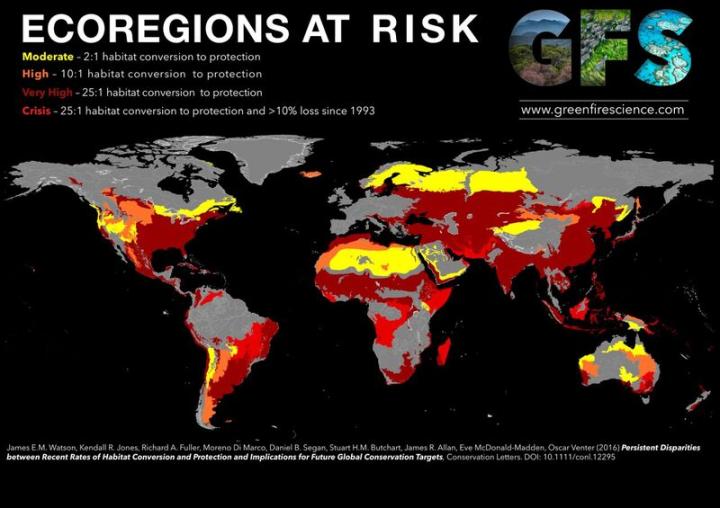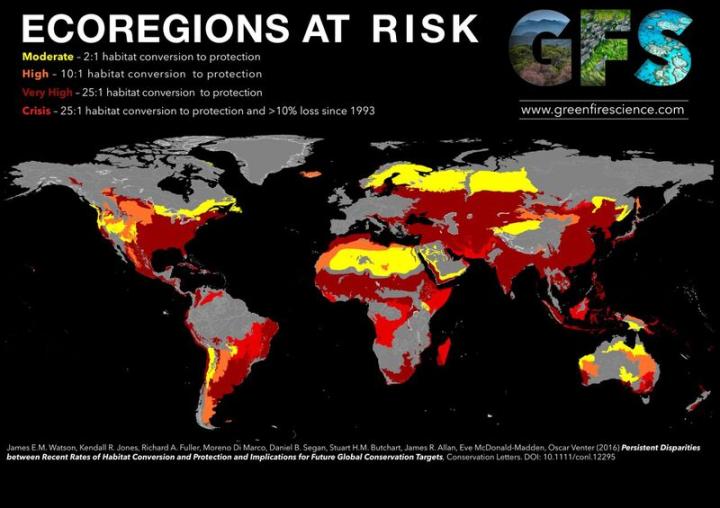
Credit: Courtesy of WCS
NEW YORK (December 6, 2016) – As 196 signatory nations of the Convention of Biological Diversity (CBD) meet this week in Cancun, Mexico, to discuss their progress towards averting the current biodiversity crisis, researchers from a range of universities and NGOs report in the international journal Conservation Letters that habitat destruction still far outstrips habitat protected across many parts of the planet.
The researchers assessed rates of habitat conversion versus protection at a 1 km resolution across the worlds 825 terrestrial ecoregions (areas that contain unique communities of plant and animal) since the CBD was first ratified in 1992. They showed that while there have been considerable gains in global efforts to increase the size of protected area estate, alarming levels of habitat loss still persist.
They discovered that over half the planet can be classified as completely converted to human-dominated land use, with 4.5 million square kilometers (an area two thirds the size of Australia) converted in the past two decades alone.
"As a consequence of past and recent habitat loss, almost half of the world's ecoregions now must be classified at very high risk, as they have 25 times more land has been converted than protected," said Dr. James Watson of the University of Queensland and the Wildlife Conservation Society, and the lead study's lead author.
These highly converted and poorly protected ecoregions occur across all continents and dominate Europe, south and Southeast Asia, western South and North America, western Africa, and Madagascar.
"It is now time political leaders recognize that simply chasing protected area targets while ignoring the impacts of rampart habitat loss is not a good solution for much of the world's imperiled species' said Dr. Oscar Venter, of the University of Northern British Colombia and the author's senior author. "We need to specifically target protected areas to places where habitats are disappearing, before it is too late."
The researchers identify forty-one ecoregions across 45 nations that are in a 'crisis state', where humans have converted more than 10 percent of the little remaining habitat in just the last two decades.
"These crisis and at-risk ecoregions are clearly the place where targeted conservation interventions need to be prioritized," said Dr. Watson. "But this means a rethink in how nations do conservation planning. Nation's tend to place protected areas in remote locations, where nobody else is vying to convert the land. This does not help save threatened biodiversity and we must urgently start strategically placing new protected areas in places that will be destroyed without conservation action."
These highly converted and poorly protected ecoregions occur across all continents and dominate Europe, south and Southeast Asia, western South and North America, western Africa, and Madagascar.
###
WCS (Wildlife Conservation Society)
MISSION: WCS saves wildlife and wild places worldwide through science, conservation action, education, and inspiring people to value nature. To achieve our mission, WCS, based at the Bronx Zoo, harnesses the power of its Global Conservation Program in nearly 60 nations and in all the world's oceans and its five wildlife parks in New York City, visited by 4 million people annually. WCS combines its expertise in the field, zoos, and aquarium to achieve its conservation mission. Visit: newsroom.wcs.org Follow: @WCSNewsroom. For more information: 347-840-1242.
Media Contact
John Delaney
[email protected]
718-220-3275
@TheWCS
http://www.wcs.org
############
Story Source: Materials provided by Scienmag





